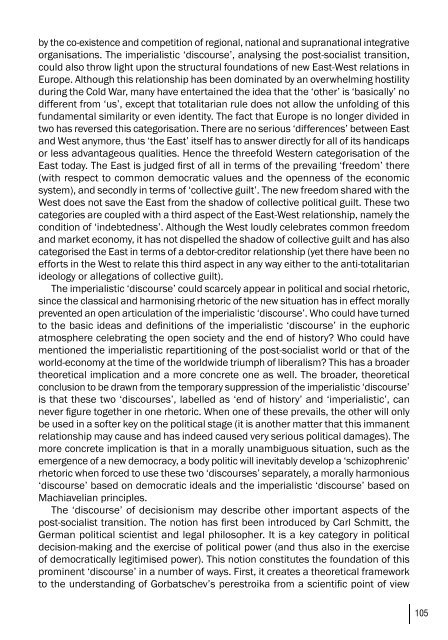art-e-conomy _ reader - marko stamenkovic
art-e-conomy _ reader - marko stamenkovic
art-e-conomy _ reader - marko stamenkovic
Create successful ePaper yourself
Turn your PDF publications into a flip-book with our unique Google optimized e-Paper software.
y the co-existence and competition of regional, national and supranational integrative<br />
organisations. The imperialistic ‘discourse’, analysing the post-socialist transition,<br />
could also throw light upon the structural foundations of new East-West relations in<br />
Europe. Although this relationship has been dominated by an overwhelming hostility<br />
during the Cold War, many have entertained the idea that the ‘other’ is ‘basically’ no<br />
different from ‘us’, except that totalitarian rule does not allow the unfolding of this<br />
fundamental similarity or even identity. The fact that Europe is no longer divided in<br />
two has reversed this categorisation. There are no serious ‘differences’ between East<br />
and West anymore, thus ‘the East’ itself has to answer directly for all of its handicaps<br />
or less advantageous qualities. Hence the threefold Western categorisation of the<br />
East today. The East is judged first of all in terms of the prevailing ‘freedom’ there<br />
(with respect to common democratic values and the openness of the economic<br />
system), and secondly in terms of ‘collective guilt’. The new freedom shared with the<br />
West does not save the East from the shadow of collective political guilt. These two<br />
categories are coupled with a third aspect of the East-West relationship, namely the<br />
condition of ‘indebtedness’. Although the West loudly celebrates common freedom<br />
and market e<strong>conomy</strong>, it has not dispelled the shadow of collective guilt and has also<br />
categorised the East in terms of a debtor-creditor relationship (yet there have been no<br />
efforts in the West to relate this third aspect in any way either to the anti-totalitarian<br />
ideology or allegations of collective guilt).<br />
The imperialistic ‘discourse’ could scarcely appear in political and social rhetoric,<br />
since the classical and harmonising rhetoric of the new situation has in effect morally<br />
prevented an open <strong>art</strong>iculation of the imperialistic ‘discourse’. Who could have turned<br />
to the basic ideas and definitions of the imperialistic ‘discourse’ in the euphoric<br />
atmosphere celebrating the open society and the end of history? Who could have<br />
mentioned the imperialistic rep<strong>art</strong>itioning of the post-socialist world or that of the<br />
world-e<strong>conomy</strong> at the time of the worldwide triumph of liberalism? This has a broader<br />
theoretical implication and a more concrete one as well. The broader, theoretical<br />
conclusion to be drawn from the temporary suppression of the imperialistic ‘discourse’<br />
is that these two ‘discourses’, labelled as ‘end of history’ and ‘imperialistic’, can<br />
never figure together in one rhetoric. When one of these prevails, the other will only<br />
be used in a softer key on the political stage (it is another matter that this immanent<br />
relationship may cause and has indeed caused very serious political damages). The<br />
more concrete implication is that in a morally unambiguous situation, such as the<br />
emergence of a new democracy, a body politic will inevitably develop a ‘schizophrenic’<br />
rhetoric when forced to use these two ‘discourses’ separately, a morally harmonious<br />
‘discourse’ based on democratic ideals and the imperialistic ‘discourse’ based on<br />
Machiavelian principles.<br />
The ‘discourse’ of decisionism may describe other important aspects of the<br />
post-socialist transition. The notion has first been introduced by Carl Schmitt, the<br />
German political scientist and legal philosopher. It is a key category in political<br />
decision-making and the exercise of political power (and thus also in the exercise<br />
of democratically legitimised power). This notion constitutes the foundation of this<br />
prominent ‘discourse’ in a number of ways. First, it creates a theoretical framework<br />
to the understanding of Gorbatschev’s perestroika from a scientific point of view<br />
105


